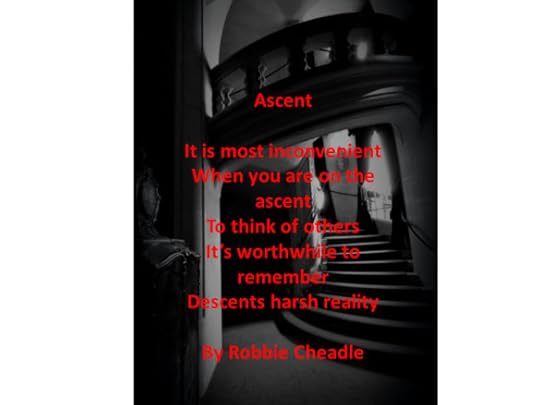K.D. Dowdall's Blog, page 38
May 12, 2018
Scaring the Lit Out of Yourself: Making Good Horror From Bad Memories (World View Part 2)
Fantastic writing! Thank you for teaching something very real – truth, resonance, writing from the gut about deeply personal fears and experiences. I am reblogging this too, you deserve the highest praise.
 Zombie Salmon (the Horror Continues)
Zombie Salmon (the Horror Continues)
When Horror writers think of Horror as Literature, we think foremost of Lovecraft; Lovecraft is so intimately and unequivocally ours…Unlike Poe, who having been repeatedly devoured by Critics of Olde (who in turn we resolutely believe did not “get” us), seems hopelessly ensnared in academic debate even as he rises as proof that Horror is indeed Literary. Lovecraft is accessible to our imaginations.
Lovecraft is indeed different. Lovecraft is us.
He is the traditionally rejected writer dedicated to his own vision of monsters. He is the rebellious outsider, the flawed character in his own story, a rich man made poor, a lonely man made so by his own inability to navigate society. He is the one who said, “I told you so,” the one who showed up his critics and enemies by outlasting them all, and becoming one of the foremost and most immortal of Horror writers. Lovecraft is our…
View original post 3,219 more words
My First List of Banned/Challenged Books
This is Professor French’s partial list of banned books for those who wish to be members of the ULS (Underground Library Society). In my opinion when books are banned for whatever reason it gives license for our government to ban other books our government may not agree with. There is an inherent danger in even one book being banned. The second list is now posted on his blog at: https://charlesfrenchonwordsreadingan...
 charles french words reading and writing
charles french words reading and writing
The ULS: The Underground Library Society

As the creator of the ULS, The Underground Library Society, and at the request of several followers, I have decided to put up lists of books that have been banned or challenged. If a book is challenged, that usually means there were people who wanted it removed from a school or library. Both are forms of book censorship. It is important to note that I am not focusing only on books banned or challenged in the United States of America; unfortunately, censorship is a world wide action.
Here is my initial list of banned and challenged books:
The entire Harry Potter series by J. K. Rowling;
To Kill A Mockingbird by Harper Lee;
The Adventures of Huckleberry Finn by Mark Twain;
Beloved by Toni Morrison;
The Satanic Verses by Salman Rushdie;
The Catcher in the Rye by J. D. Salinger;
The Grapes of…
View original post 40 more words
May 9, 2018
Who Should You Listen to – Reviewers, Peers or Readers?
This is a guest post by Lily Kaligian on Nicholas Rossis blog. Lily is an editor atBusinesscheck.co.nz and Canadabiz.net. This is a must read, especially for new writers like me. This excellent post informs me that I should ask several readers, a reviewer or two, and several peers, to critique my book prior to publication. It is something I have not done in the past. I certainly will now. Thank you Lilly and Nicholas! https://nicholasrossis.wordpress.com/2018/05/09/who-should-you-listen-to-reviewers-peers-or-readers
 This is a guest post by Lily Kaligian. Lily is an editor at Businesscheck.co.nz and Canadabiz.net. She creates a variety of articles about careers, entrepreneurship, technology, business, education, as well as travel and personal development.
This is a guest post by Lily Kaligian. Lily is an editor at Businesscheck.co.nz and Canadabiz.net. She creates a variety of articles about careers, entrepreneurship, technology, business, education, as well as travel and personal development.
Who Should You Listen to – Reviewers, Peers or Readers?
Having your writing work read and appraised by others can be a very emotional experience. When you’ve poured your heart and soul into creating a novel, a short story, a poem or even just a blog post, you need to know that it’s not just you who sees your creation as valuable.
But writing and reading are incredibly subjective. One person’s prize winner could be another’s trashy holiday read. It can be hard working out who to trust when it comes to feedback and critique. Whose opinion should you take into account when reviewers, peers, and readers all have something to say?
Reviewers
View original post 489 more words
#writephoto – Ascent
This is an excellent short poem by Robbie, that she wrote for a tanka poem for Sue Vincent’s Thursday Write Photo Prompt. You can join in the fun here: https://scvincent.com/2018/05/03/thursday-photo-prompt-ascent-writephoto/ Robbie’s writes what is really important, and that is caring, sharing, and having an honest regard for others. It reveals more than any other single aspect of a person’s character through actions not words. Visit Robbie’s blog for other wonderful poems, that I personally love to read for her insight into human cares.
https://robbiesinspiration.wordpress.com/2018/05/08/writephoto-ascen

This tanka poem was written for Sue Vincent’s Thursday Write Photo Prompt. You can join in the fun here: https://scvincent.com/2018/05/03/thursday-photo-prompt-ascent-writephoto/
May 7, 2018
#197 – The Tale of the Last of The Tree People
Gregg Savage is an amazing writer of fables and fairy tales for children, however his stories are meant for grown up readers as well. I love his stories that say so much from a child’s point of view and in doing so, Gregg gives us something to learn about life that we may forgotten in the daily rush of living. Just wonderful! https://dailytales.com.au/2018/05/06/197-the-tale-of-the-last-of-the-tree-people
 The Daily Tales of Gregg Savage
The Daily Tales of Gregg Savage
The Tree People had a reputation for being peaceful. Even the townspeople who did not agree with their lifestyle were the first to admit that The Tree People were not aggressive in any way and that their tree houses were, in fact, quite beautiful. What they did not agree with, however, were the laws stating that any tree already claimed by a tree person or a family of tree people, could not be used in any way whatsoever by the townspeople. In the eyes of the law, a tree where people chose to live was now officially a home and was therefore treated accordingly. This meant entire forests, once worth great fortunes, were now worthless to the builders, carpenters and businesspeople of the town of Greenvale, and this fact filled them with resentment for The Tree People. As in all situations where desires, beliefs and passions collide, a disagreement arose…
View original post 638 more words
May 6, 2018
An Invitation to Join the ULS: The Underground Library Society
I’m in! I am joining Charles F. French’s, Underground Library Society! Now, we just need a list of banned books, because fantasy, fairy tales, and science fiction are always on the block to be banned – consider Harry Potter – a religious group wanted it banned. Unbelievable. So – be afraid, be very afraid (just kidding), because who knows, your book could be next! Join the ULS !
 charles french words reading and writing
charles french words reading and writing

As some of you know, the students in my English 2 class at Lehigh University became members of a group I created for my class on book banning, the U.L.S. or the Underground Library Society.
It is based on Ray Bradbury’s extraordinary novel Fahrenheit 451 in which the owning and reading of books is a criminal act. A group of seeming nomads attempt to save books by “becoming” them. They memorize books in the hope that one day books will again be able to be printed.
My students had to choose a book they would become, blog about it, and create a poster featuring the logo of the group: a book with the letters ULS on it. Additionally, they put the title of the book and a statement about it on the poster. This was one of the most successful class activities that I have had the pleasure of…
View original post 124 more words
May 4, 2018
#195 – The Tale of a Story Never Told
I love fairy tales and this tale is one that was never told. A wonderful story by Gregg Savage at: https://dailytales.com.au/2018/05/04/195-the-tale-of-a-story-never-told/
 The Daily Tales of Gregg Savage
The Daily Tales of Gregg Savage
Once upon a time, in a world dense with even the most mundane of stories, there lived a story bursting at the seams to be told. For any decent story, however, it wasn’t enough just to be told, they had to be heard, and that’s precisely what this story wanted. The more people that got to hear a story, the better for the story, but most stories believe that being heard by one person is better than never being heard at all.
It’s difficult to describe the pain a story feels when it cannot be told, let alone heard, but it is a pain the builds up over time. Meaning that the longer the story goes without being told, the more painful it becomes. It is a sad day when a story that wanted to be told fades away into nothing, never knowing what might have been if it was…
View original post 522 more words
May 1, 2018
16 Ways to Increase Creativity and Generate ideas!
We’re all looking for ways to increase creativity, but sometimes it isn’t easy. No matter what kind of work you do, sometimes you run into a wall; the ideas dry up and you feel anything but creative. It happens to everyone. Don’t worry. You’re not alone. You need a break. You need a strategy. You need a saga.
Posted by Seth on http://www.happenchance.net/16-ways-to-increase-creativity-and-generate-ideas/
Here’s your saga, delivered in 16 steaming hot points. Use them, abuse them, but do tell me how they work for you.
1. Consistent Effort If you make a consistent effort to create new things, you’re bound to have results. If you just wait around for inspiration to strike, you could be waiting for a long time. Inspiration tends to strike those who are already in the middle of the creative process. A reward, if you will, for your diligent work.
2. Record Everything Keep a notebook, sketchbook, or recording device handy at all times. Ideas are slippery as eels, and if you wait too long, the damn things will swim away. If you have a smashing idea just before you fall asleep, you probably won’t remember it in the morning, and if you’re driving or rolling on the subway, something else will distract your attention.
3. Elaborate on Something If you’ve already made something cool, go back and see if you can’t expand on it. Especially if some time has passed and an idea has had time to incubate, you’ll have new things to add, angles to elaborate on.
4. Switch Gears If you’re doing brain work, do body work, and vice versa. If you’re writing a report, do a puzzle, if you’re building a sculpture of a giant chrome sponge, sing a song.
5. Think Laterally Look for associated ideas, especially while you’re already working on something. As I’m writing this, I’ve had ideas for four six more posts. While I won’t use them all, it’s nice to have them to draw from.
6. Mind Maps Mind maps are effective because they make the most of lateral, horizontal thinking. They give you a chance to put a lot of information down about a topic without worrying about actually organizing the information. This is just my opinion, but mind maps may be a close representation of how thoughts are structured. Here’s the wiki entry.
7. Don’t be Afraid of Bad Ideas When you have a lot of bad ideas, you’re bound to have good ones. Plus, with lots of bad ideas you’ll have less trouble telling the good from the bad.
8. Get Emotional Horror movies and comedies come to mind, but you can also read really sad stories, instigate an argument with a stranger, walk in a grave yard, whatever. Just apologize if things get out of hand.
9. Hang out With Friends Depending on your ‘vert persuasion*, you may need more or less of this, but fun with friends can be relaxing. Just shooting the shit and forgetting about things for a while can give your brain some breathing room (*introvert or extrovert).
10. Sleep On It Whether you’re working on a problem or looking for new ideas, sleep can give your brain the chance to mull a problem over, give you a new plan of attack.
11. Take a Hike Walking is good, but hiking is better. Mind-body connection, you’ve heard it before, but it really works. If you’re trying to generate new ideas or feeling stumped, getting the blood flowing seems to mix things up. When the body starts working, more neurons start firing. While walking is good, getting out in the woods is better. Being in nature reduces stress.
Go to .http://www.happenchance.net/16-ways-to-increase-creativity-and-generate-ideas/
We’re all looking for ways to increase creativity, but s...
We’re all looking for ways to increase creativity, but sometimes it isn’t easy. No matter what kind of work you do, sometimes you run into a wall; the ideas dry up and you feel anything but creative. It happens to everyone. Don’t worry. You’re not alone. You need a break. You need a strategy. You need a saga.
Posted by Seth on http://www.happenchance.net/16-ways-to-increase-creativity-and-generate-ideas/
Here’s your saga, delivered in 16 steaming hot points. Use them, abuse them, but do tell me how they work for you.
1. Consistent Effort If you make a consistent effort to create new things, you’re bound to have results. If you just wait around for inspiration to strike, you could be waiting for a long time. Inspiration tends to strike those who are already in the middle of the creative process. A reward, if you will, for your diligent work.
2. Record Everything Keep a notebook, sketchbook, or recording device handy at all times. Ideas are slippery as eels, and if you wait too long, the damn things will swim away. If you have a smashing idea just before you fall asleep, you probably won’t remember it in the morning, and if you’re driving or rolling on the subway, something else will distract your attention.
3. Elaborate on Something If you’ve already made something cool, go back and see if you can’t expand on it. Especially if some time has passed and an idea has had time to incubate, you’ll have new things to add, angles to elaborate on.
4. Switch Gears If you’re doing brain work, do body work, and vice versa. If you’re writing a report, do a puzzle, if you’re building a sculpture of a giant chrome sponge, sing a song.
5. Think Laterally Look for associated ideas, especially while you’re already working on something. As I’m writing this, I’ve had ideas for four six more posts. While I won’t use them all, it’s nice to have them to draw from.
6. Mind Maps Mind maps are effective because they make the most of lateral, horizontal thinking. They give you a chance to put a lot of information down about a topic without worrying about actually organizing the information. This is just my opinion, but mind maps may be a close representation of how thoughts are structured. Here’s the wiki entry.
7. Don’t be Afraid of Bad Ideas When you have a lot of bad ideas, you’re bound to have good ones. Plus, with lots of bad ideas you’ll have less trouble telling the good from the bad.
8. Get Emotional Horror movies and comedies come to mind, but you can also read really sad stories, instigate an argument with a stranger, walk in a grave yard, whatever. Just apologize if things get out of hand.
9. Hang out With Friends Depending on your ‘vert persuasion*, you may need more or less of this, but fun with friends can be relaxing. Just shooting the shit and forgetting about things for a while can give your brain some breathing room (*introvert or extrovert).
10. Sleep On It Whether you’re working on a problem or looking for new ideas, sleep can give your brain the chance to mull a problem over, give you a new plan of attack.
11. Take a Hike Walking is good, but hiking is better. Mind-body connection, you’ve heard it before, but it really works. If you’re trying to generate new ideas or feeling stumped, getting the blood flowing seems to mix things up. When the body starts working, more neurons start firing. While walking is good, getting out in the woods is better. Being in nature reduces stress.
12. Free Write Similar to morning journaling, only more focused on a single problem. Write about your topic, whatever you’re stuck on, for about fifteen minutes. Don’t censor, don’t edit, just write whatever comes to your head. Works best if the pen doesn’t leave the paper.
13. Take a Media Fast Lots of people of written on this, but there’s a reason: it’s effective. Media, this blog included, can be a huge time sink; consumption can can stifle creativity. Taking a complete break can be challenging, but the rewards are well worth it.
14. Learn a Useless Skill Useless skills are entertaining and make life more fun.
15. Really Listen To Music. Without other distractions, just put on a amazing record, put on good headphones, sit back, relax, and listen. Pick out a single instrument to follow. Feel the groove, the flow of the record. If the feeling gets you, get up and dance.
16. Do stuff you find troubling. Shoot a gun. Gamble. Get sick on liquor. Eat a bloody steak. Give alcohol to a bum. Go to a strip club. Watch television for a couple hours. Sniff glue and go to a creepy mega-church (okay, scratch the sniffing glue part). Going outside of your comfort zone will give you new ideas.
We’ve reached the end of a long list, but I’m sure I’ve missed some stuff. What can you add? Don’t be shy!
Writing Tips: Know Your Audience!
Posted by Melissa Donovan on April 19, 2018 ·http://www.writingforward.com/?utm_so...
It’s an old adage for writers: know your audience. But what does that mean? How well must we know the audience? And does knowing the audience increase our chances of getting published or selling our books?
Some writers insist that the best way to write is to just write for yourself. Sit down and let the words flow. It’s true that sometimes a freewheeling approach will result in some of your best work. And writing that way is immensely enjoyable. But there are times when a writer must take readers into consideration.
So we have these two contradictory writing tips: know your audience and write for yourself. Taken together, they don’t make much sense, so let’s sort them out. Today, we’ll focus on knowing your audience.
In business, academic, and other types of formal writing, the audience is a consideration from the very beginning. You wouldn’t write a business letter peppered with internet shorthand (LOLs and OMGs), and you shouldn’t use casual language in an academic paper. In instances like these, it’s easy to see why you must keep your reader in mind throughout the entire project, but what about poetry, creative nonfiction, and fiction writing? Should the work be influenced by its intended readers? At what point does the audience begin to matter? And who is the audience, anyway?
Goals Matter
Some writers know they want to write children’s books, so they keep a young audience in mind. After all, it wouldn’t do to write a children’s book laden with adult language or love scenes. Other writers want to publish a memoir, hoping their own personal story will inspire others. And if you’re hoping to inspire people, you should have a good idea about which people you want to inspire — whether they’re spiritual, impoverished, or creative.
These types of writers have specific goals, and their writing must be aligned with those goals.
That’s why in some cases, it’s essential to know who your audience is before you begin writing. But there are other cases when the goals aren’t so clear, and therefore, neither is the audience. In cases like these, does a writer ever need to think about readers?
Goals Aren’t Always Necessary (and Neither is an Audience)
When you write for the sheer joy of writing or love of craft and you do so without any particular goal in mind, the creative magic can sweep you away. When I wrote my novel for NaNoWriMo in 2008, I started with nothing more than a few characters. My only goal was to write at least 50,000 words. I didn’t give a thought to the audience. And I’m certain that approaching the project this way, with an open mind and without any particular goal in terms of content, is what enabled me to actually complete the first draft of my first novel. It felt like quite an achievement.
When I finished my novel, I knew instantly who the audience was. I had written a young adult novel! If I ever decide to revise and polish that (very rough) first draft and polish it for publication, knowing that the book is geared toward young adults will be helpful in informing the way I approach editing and proofreading. I’ll pay attention to the language to make sure it’s age-appropriate, and I’ll make sure the characters, themes, and everything else are suitable for the target age group.
Agents and publishers often specialize in specific types of writing; they cater to clearly defined audiences. Therefore, as a writer, it helps to know who the audience will be when polishing a manuscript and looking for publication opportunities. This becomes even more critical once the book gets published and marketing begins.
The Benefits of Knowing Your Audience (and When It’s Absolutely Necessary)
If you write in a journal and nobody ever sees your work, then you don’t need to think about an audience. Readers come into play when you decide to publish your work. There’s a point when you decide that you want to cross over from writer to published author, and it’s at that point that the audience starts to matter in a big way.
Agents and publishers can’t do much with your work if the audience is unclear. This is particularly relevant with fiction and nonfiction. There are dozens of poetry markets, so chances are, you can find your audience after the writing is done and polished. But other genres need to be marketed to the right readers. This is also a factor in blogging and self-publishing.
Publication is the point where your art shifts into business mode. It’s the stage when you say, “I want to do this for a living and make money doing it.” That means you’re going to have to sell, and anytime you’re selling anything, you need to know to whom you’re selling.
Some Writing Tips Aren’t Absolute
So, the answer isn’t all that clear. There are some writers who need to know their audience from a project’s conception. Others don’t need to consider an audience until they decide to try getting published. Poets can probably get away with not thinking about the audience until they start looking for publications where they can submit their work. But one thing’s certain: once you set your sights on publication, that means you’re looking for readers. And since readers are your audience, you’ll have to give them some consideration.







